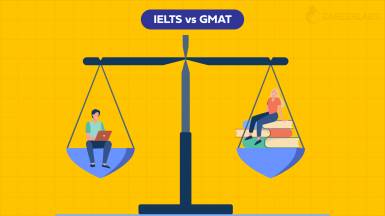GMAT vs IELTS- Know the Difference
 Posted date: 04 Jul 2023
Posted date: 04 Jul 2023
When aspiring to pursue higher education at the graduate level, international students often face the decision of taking standardized tests to demonstrate their academic proficiency and language skills. The Graduate Management Admission Test (GMAT) and the International English Language Testing System (IELTS) are two commonly required exams. Understanding their unique features, components, scoring systems, and relevance for graduate programs is crucial. This article provides a comprehensive comparison of GMAT and IELTS, aiding prospective students making an informed choice based on IELTS and GMAT difference.
What is the difference between IELTS and GMAT?
GMAT: Tailored specifically for business school admissions, the GMAT assesses analytical, quantitative, verbal, and integrated reasoning skills, making it a crucial requirement for MBA and other business-related courses at renowned institutions worldwide.
IELTS: Widely accepted by universities and educational institutions in English-speaking countries, the IELTS evaluates candidates' ability to effectively communicate in English across different academic and social scenarios. It is commonly used for admission to undergraduate and graduate programs in various fields.
Key Differences
Several key differences exist between the GMAT and IELTS, highlighting their distinct focus, test structure, scoring systems, and target audience.
-
Test Focus:
The GMAT evaluates skills relevant to business and management programs, focusing on analytical, quantitative, verbal, and integrated reasoning abilities. In contrast, the IELTS assesses English language proficiency for academic and social purposes, encompassing listening, reading, writing, and speaking skills.
2.Test Structure:
GMAT: Consists of four sections: Quantitative Reasoning, Verbal Reasoning, Integrated Reasoning and Analytical Writing Assessment (AWA). The AWA involves analyzing and critiquing an argument, the IR measures data interpretation and synthesis skills, and the Quantitative and Verbal sections assess mathematical, problem-solving, and language abilities.
On the other hand, the IELTS: The exam consists of four sections: reading,speaking and writing. The Listening section assesses comprehension of spoken English through various recordings, the Reading section evaluates reading skills through academic texts, and the Writing section involves completing two writing tasks, usually involving descriptive and argumentative essays. The Speaking section involves a face-to-face interview to evaluate oral communication and fluency.
3.Scoring System:
The GMAT score ranges from a scale of 200 to 800 , with separate scores for the Verbal and Quantitative sections. On a scale from 0 to 6, the AWA and IR portions are graded individually. The overall GMAT score is a combination of the Verbal and Quantitative scores.In contrast, the IELTS scoring system ranges from 0 to 9, with half-point increments. Test-takers receive a band score for each section, and an overall band score is provided, representing an average of the four individual scores.
4.Target Audience:
The GMAT is primarily aimed at individuals aspiring to pursue graduate business programs, specifically MBA courses, and other business-related disciplines. It caters to those looking to enhance their business acumen and management skills. In contrast, the IELTS is suitable for anyone who needs to demonstrate their English language proficiency, whether for academic, professional, or immigration purposes. It is widely accepted across various fields and is used by individuals seeking opportunities in English-speaking countries.
In conclusion, the choice between GMAT and IELTS depends on the individual's academic and career goals. If the aim is to pursue a graduate business program, the GMAT is the appropriate choice. For those seeking admission to a broader range of academic programs in English-speaking countries or requiring English language proficiency validation, the IELTS is the more suitable option.
Posted By

GSP Admin




